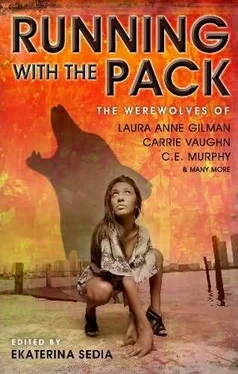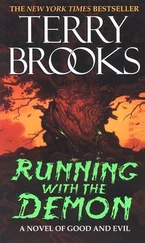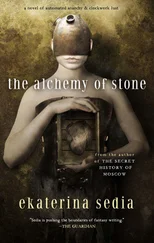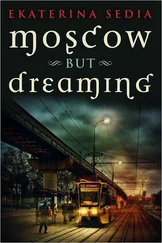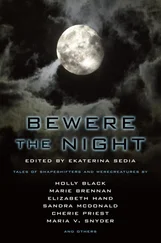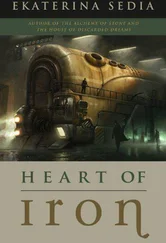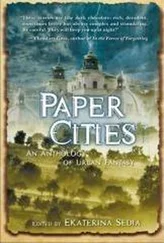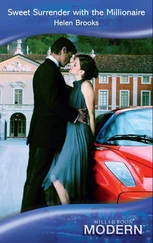Thomas leapt clear, the blood that spattered belonging to the horse, not himself: it was done for, belly split open by the female’s bite as she died. The male, screaming fury, rushed Thomas, who flung his gun away and drew a long knife, his pigsticker spear broken by the horse’s fall. There was no fear in his scent, nor could there be, should he hope to survive.
A snarl rose up in Markéta’s throat. She turned it to the sky in a howl, sharp sound of warning and loss, and trotted out of the brush to let the hunter see her.
For a deadly instant surprise took him, and in that moment, so did the boar.
She had never seen one throw a man. It caught his gut easily, and turned its weight against him, flinging him a distance only aborted by the presence of an oak tree. Thomas hit it with bone-cracking force and slid down, blood turning his shirt and hands to crimson. The boar snorted, charged again, then veered away into the broken underbrush, chasing after its offspring.
The horse lay on its side, thrashing. Markéta darted around its dangerous legs, scampered back from bared teeth broader and stronger than her own. There were other predators better suited to this kill than wolves; her jaws were strong, but she had seen how big cats could strangle their prey in mere seconds. Wolves tore and shredded at haunches, only taking the throat last, when the beast was already weakened, and the horse was still too strong with fear to be called weak. Still, it deserved better than the death coming to it, and she lunged in when silence took it for a moment.
It took a long time, blood hot and sweet on her tongue. As its gasps died, she heard Thomas’s increasing, and rolled her eyes, desperate to see but unwilling to release the horse and extend its death any longer. The gun was gone: Thomas had flung it well away, and was bleeding too heavily to search for it. But he was strong, and mercy shown to the horse could count against her own life.
It finally shuddered and died, strength gone from its great muscles. Markéta backed off, head lowered as she swung toward Thomas.
He was white-faced, drained of blood but not emotion; rage etched deep lines in his skin.
“What is man but a pack animal?” The words came from Markéta’s throat distorted, harsh, angry; a wolf was not meant to form human speech. She changed again, staying where she was, lithe on all fours, horse blood drooling down her chin. She had abandoned her clothes before taking lupine form; they would not change with her, and she knew now she looked a wild thing, monstrous human bathed in blood.
“We are only those who chose to heed the wild, so long ago. We learned to stay away from your penned cattle, your easy sheep, your fine horses. We hunted in the wood, and ran as one, while you our brothers constricted yourselves into dull unsensing human form. We did not threaten you, hunt your children, ruin your lives, and yet you came for us. That was my mother !”
She forgot, in springing forward, that she was only a woman, and had no teeth to tear his throat with. Instinct older than thought judged her and made weapons of her hands, curved to dig fingers in where tooth would not do. She might not have bothered; her weight was on his belly, where the boar had seized him, and the man screamed.
It drew her up. Not from mercy, but because to talk, to threaten and to posture, was the human and not the lupine way. A wolf hunted and killed, rather than allowed its prey to linger.
A pity, then, that this man, and others like him, had obliged her live so long in their world. “My mother,” she whispered again. “My family. My pack, dead for sport.”
He smiled, bloody and brief. Drew breath, held it, and spat it: “ Dog . Do you think . . . we didn’t know . . . what we hunted? Mongrels. Monsters. Sinners. You are the last . . . in England . . . and my son will carry on the hunt in Europe!”
She ought to have been wary. Ought to have known he would carry another weapon; that a second knife could be secreted more easily than a gun. He moved faster than a dying man should, but the surge of muscle warned her. The blade glittered and she turned into it, ducking low, body transformed without a thought. The horse’s neck had been massive in her jaws; his wrist was fragile, and bone shattered all too clearly beneath his scream.
She tore the sound out with a single bite, spitting away flesh she had no desire to feast on. A wolf would have taken his throat before, and never learned that he’d known what he hunted. That was worse, worse by far, than she might have imagined. She would have to leave Britain, find her brethren elsewhere and warn them.
A branch cracked, folly of human intrusion. Markéta snarled and fell back from Thomas’s body, lost between knowing whether to run or to take human form and bluff. Run; she would run, away from England’s shores, but first there were other men to be dealt with.
Radcliffe stood at the edge of the clearing, a gun held loosely in his hands as he stared at Thomas’s body. “His father stole horses from my grandfather,” he said eventually, softly, though there were no other humans nearby to hear him. “I had hoped for some satisfaction in that. Some mark of watching him embarrassed by a woman out-hunting him. I had not imagined . . . this. It is you, Markéta, is it not?” His gaze lifted to her, almost apologetic. “I saw, when you . . . when you spoke to him. When you took human form. You are a . . . ”
“Wiaralde-wulf.” Those words, so ancient they were made for a wolfen tongue, still hurt her throat. Markéta changed, cautiously, to her human form, to speak more easily. “A world wolf, by our own name. Werewolf , by yours. As old as man, and closer to the world than you now are.”
“Mother of God. ” Radcliffe fell back a step, gun clutched to his chest like a woman might clutch a kerchief. “ Markéta ?”
“Please, sir.” A whisper of humor bent her smile, though she could feel blood drying around it. “’Miss Alvarez.’”
He drew himself up, gun still held like a bludgeoning weapon. “You are naked in my sight, dear woman. I believe I might call you by your given name.”
“Only if you intend to make me your wife.” Her gaze flickered to the gun. “Will you shoot me, if I run?”
“Would you have me?” he asked at the same time. They stared at one another, Markéta still primed to run, and Radcliffe’s eyes dropped to the gun he held. He cast it away with a shudder, then looked to her again. “You said to Thomas that you were the ones who chose to heed the wild. Can a man make that choice even still? Can he become . . . wiaralde-wulf even now?”
“Not in memory.” Markéta hesitated, creeping forward a few steps. He was unarmed; she could kill him, if she must. “But in legend . . . .”
“In legend, as we tell it? Through a bite?”
“And through the tending of the wound. Why would you want it? We are hunted.” Markéta spat at Thomas’s body.
Radcliffe smiled faintly. “What man would want a wife capable of such astonishing feats that he could not himself achieve? Would you have me, Markéta Alvarez?”
She glanced at herself: naked, bloody, fingers caked with gore and her face and throat no doubt worse. Beneath the horror, well-enough endowed in human standards, her frame neither overwhelmed nor embarrassed by the curves she possessed. Then she lifted her gaze to Radcliffe’s, watching his face and stance as she shifted to her wolf form. Scenting for his apprehension, preparing herself to face fear.
She found curiosity in his cant, and wonder, easily read as a puppy’s. Eagerness, like a pup’s enthusiasm for exploration, though he was a man fully grown. Caution threaded through it: he saw her as the predator she was, but extended wary trusts. Beneath it all, though, a line of confidence was struck, familiar tone seen in any pack leader. He was certain of the choice he was asking both himself and her to make.
Читать дальше
